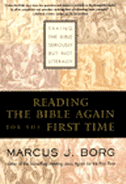Chapter 1
We need a new set of lenses, or ways of seeing the Bible at a time when
biblical awareness in society is in decline , Fundamentalist vs. moderate
to liberal (mainline) split A major 'deliteralizing' of the scriptures
is underway The dispute is focused in three key areas: creation vs. evolution,
homosexuality, contemporary historical Jesus scholarship
The phenomenon of Bible reading began with the revolution of the printing
press (15th century) which led to the democratization
of Christianity; individualistic interpretation and the fragmentation of
the church after the Protestant Reformation.
NATURAL LITERALISM is the standard traditional approach to the Bible. Many of us came out
of backgrounds that practiced 'soft literalism'. The events of the Bible
happened pretty much as reported.
Origin: Bible as divine product; Authority: Bible as true, authoritative.
Interpretation: the Bible is historically, factually true
Characteristics: literal, doctrinal, moralistic, patriarchal, excusivistic
The Current Situation:
1. We live in a world of religious pluralism
2. Historical and cultural relativity dominates (we are shaped by culture)
3. Modernity has prevailed for many years, characterized by
- scientific ways of knowing
- skepticism about religious reality
- preoccupation with factuality
- both fundamentalism and scientism are products of Englightenment thinking.
4. Post-modernity is now the dominant spirit of the age
- recognition that modernity was culturally conditioned
- people are turning to a focus on experience
- evolving from a belief in 'fact fundamentalism' to a realization that
stories can be true without being literally or factually true
We are at a time when we need to 'revision' our approach to the Bible,
and
to see it again with new eyes. Refocusing from 'believing' the words of
the
Bible to relating to the God to whom the Bible points.
to the God to whom the Bible points.
|



